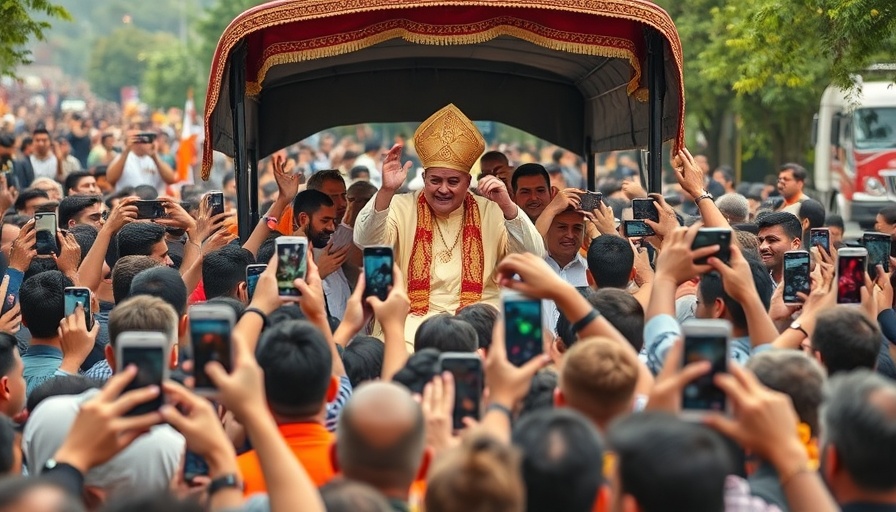
The Pope's Call to U.S. Bishops: A Stand for Immigrants
Pope Leo XIV has taken a firm yet compassionate stance on one of the most pressing issues facing the United States today—immigration. As President Trump heightens his deportation strategy, including increased National Guard presence in cities like Chicago, the pope's words resonate deeply within the halls of the Catholic Church. During a recent Holy Year Mass dedicated to migrants, Pope Leo urged U.S. bishops to rally behind immigrants, reminding them of the inherent dignity of every human being, especially those fleeing poverty and violence.
The Significance of Pope Leo’s Message
The Pope's heartfelt engagement came at a critical moment, illustrated by a moving exchange with a group of Catholics from El Paso. They presented the pope with over 100 handwritten letters from immigrants—powerful testimonies of hope and desperation. These letters pleaded for the Church to listen and act on behalf of those marginalized by socio-political forces. Bishop Mark J. Seitz, who was present during this poignant moment, described how the pope appeared visibly moved by the letters, sharing, “I am happy to stand with you.” This connection underscores the church's growing concern for its congregation amidst a climate of fear.
Diverse Perspectives on Immigration Policy
While starkly contrasting opinions exist, from those demanding tough immigration laws to advocates calling for compassionate approaches, the pope has skillfully navigated these waters. His emphasis on unity and compassion challenges bishops and parishioners alike to transcend political divisions that often cloud the issue. For many Catholics, particularly those from Hispanic backgrounds—who represent a significant portion of the church—Pope Leo's encouragement is an invitation to voice their collective pain and seek pathways for relief.
The Tension Between Church Teachings and Political Forces
In the delicate balance of faith and politics, the Trump administration's hardline stance on immigration has elicited mixed reactions within the Catholic community. Figures such as Vice President JD Vance have publicly supported stricter policies, claiming that unchecked immigration undermines social solidarity in America. This perspective, while rooted in a desire for national cohesion, starkly contrasts the Church's teachings on the fundamental rights of individuals, particularly the vulnerable. It highlights the complex interplay between faith, policy, and identity in contemporary society.
Practical Insights: The Role of the Church in Advocacy
Pope Leo's call for a unified response from U.S. bishops at their upcoming conference in Baltimore exemplifies the Church’s position on immigration. The bishops are in a unique position to influence public perception and policy through compassionate outreach and advocacy initiatives. As the church prepares for this pivotal gathering, the expectation of a statement addressing these important issues is not merely symbolic. Such actions could galvanize local congregations to take a stand, offer support, and advocate for comprehensive immigration reform.
The Implications of Ignoring the Immigrant Crisis
Ignoring the immigration crisis poses substantial risks, not just for vulnerable populations but for social cohesion. As Bishop Seitz noted, “To have the United States changing so radically is something that calls for attention.” By neglecting these humanity-centered issues, the Church risks losing relevance amid its growing Hispanic congregant population who face daily uncertainties about their status. In times of division, the Church's mission to foster solidarity and compassion becomes even more essential.
Engaging the Community: Time for Action
The response to Pope Leo's clarion call could profoundly shape the future of the Catholic Church in America. As the bishops gather soon, it is vital that they not only discuss these issues but mobilize their communities toward action, fostering an environment of understanding and welcome for immigrants. The challenge lies in translating the Pope's heartfelt message into practical initiatives that uplift and support those who feel unwelcome in their own neighborhoods.
As the dialogue surrounding immigration continues to evolve, individuals have the power to advocate for the values that the Church represents. By standing in solidarity with immigrants and addressing the structural injustices they face, communities can embody the spirit of compassion that Pope Leo has urged U.S. bishops to embrace.
In this time of heightened awareness and sensitivity toward immigration issues, it is crucial for laypeople and clergy alike to engage in meaningful conversations that pave the way for reform and healing. Those who feel marginalized or threatened must know they have a voice—a voice that resonates within the Church community and beyond.
 Add Row
Add Row  Add
Add 




Write A Comment